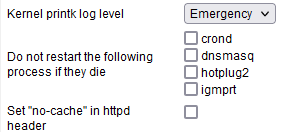User Tools
Sidebar
This is an old revision of the document!
Debugging
The Debugging page helps you tweak some parameters to allow better troubleshooting of any issues with your router.
Avoid performing an NVRAM commit: Checking this stops nvram (configuration) variables from being permanently saved. This makes it possible to safely experiment with settings, since changes reset at reboot.
Enable cprintf output to console:
Enable cprintf output to /tmp/cprintf:
Enable DDNS output to /tmp/mdu - This option allows the DDNS diagnostics to be fully logged in the /tmp/ directory.
Enable segfault logging: By default, segfault errors are not logged via the syslog functiony. Enabling this option causes them to be logged. Segfaults are Linux errors caused by a program trying to read from or write to an illegal memory location.
Count cache memory and buffers as free memory: This affects how Linux handles RAM allocation, which is split into Used + cache + buffer. If enabled, this causes cache memory and buffer to be counted as free. (Default: enabled).
Avoid displaying LAN to router connections: Enabling this prevents LAN connections from being displayed in menus that show conntrack-related data, such as the QoS/View Details menu.

Kernel printk log level:
Do not restart the following process if they die:- crond/dnsmasq/hotplug2/igmprt: Usually FreshTomato restarts dying processes. In some exceptional cases, you may want to prevent this from happening.
Set “no-cache” in httpd header - A very common issue is that is cached browser content can create errors/display issues in the web interface. Usually, refreshing the page, via CTRL+F5, fixes this problem by forcing a cache flush. However, setting this parameter is an alternative solution. This instructs the browser not to perform any caching while on FreshTomato web interface pages. Both methods are particularly useful after firmware upgrades.

